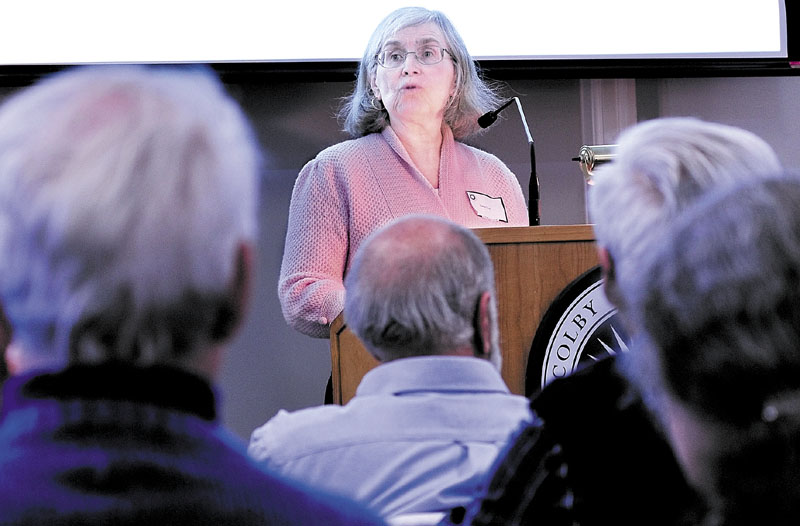WATERVILLE — Jews in late 19th Century Maine would have been very much in favor of the mural which Gov. Paul LePage removed from the state Department of Labor walls.
That was the assessment Sunday from Dr. Hasia Diner, an expert on Jewish American history who spoke at Colby College during the Second Maine Jewish History Conference.
A New York University professor and winner of the 2010 National Jewish Book Award, Diner was discussing how and why Jews immigrated to the United States and to Maine, where they at first sought anonymity and did not want to stand out.
Later, she said, they began to feel comfortable and empowered and started putting symbols on the outside of synagogues where before they did not. And they began to speak out.
They moved away from quietly and nicely asking for privileges in a largely Christian society to pushed America to change and alter some of its fundamental institutions, according to Diner, who spoke to about 70 students, professors and others who gathered in Roberts Union.
“They went from that, ultimately, to boldly and assertively putting their mark on the American landscape,” she said.
In the late 19th Century, many American Jews came to demand that the state enter into the economic life of the nation as advocates for workers and the poor, according to Diner.
“Jews would have been very much in favor of the mural,” she said, to loud applause from the group.
LePage recently had the mural, which tells the story of the labor movement in Maine, removed from the Labor Department’s walls. The governor said it was too one-sided and did not represent the interests of businesses.
Frances Perkins, who was labor secretary during the Great Depression and implemented benefits for workers, is depicted in the center panel of the mural. Perkins, a social work heroine who had Maine roots, was involved in Jewish political work, Diner said Sunday.
In addition to having the mural removed, LePage said he also wanted to rename conference rooms in the Labor Department that are named for Perkins and other labor leaders. Diner said Jews of the 19th century would have pushed to keep her name alive on the door. “That’s my little political comment,” she said.
As part of her talk on Maine’s Jews in modern Jewish history, Diner said those who immigrated to America pushed for equality in many matters, even though it was risky.
“They were willing to stand up to say, ‘This is wrong.'”
Diner’s talk traced the history of Jews in Maine, who came here for both economic opportunity and a place where they were able to live their lives relatively “unmolested,” she said.
But she emphasized the importance of understanding not only what happened in Maine — how Jews made a living and how they lived their lives — but also the national and global contexts that impacted them.
Diner, who was chosen for a 2010-11 Guggenheim fellowship, is director of the Goldstein-Goren Center for American Jewish History at NYU.
Colby Senior Mary Cummings, 22, of New Jersey attended Diner’s lecture as part of a class she is taking called “Judaism in the Modern World.” She said she had never heard a discussion specifically about Jews in Maine, and that Diner’s talk put the immigration history in greater perspective.
“I thought it was very interesting and I’m actually very excited that she is coming to one of my classes on Tuesday,” said Cummings.
Diner holds a Ph.D. from University of Illinois and is author of numerous books, including “We Remember with Reverence and Love: American Jews and the Myth of Silence After the Holocaust,” which netted her the 2010 National Jewish Book Award.
On Tuesday, Diner will deliver the annual Berger Holocaust Lecture at 7 p.m. in the Pugh Center at Colby. Her topic will be “Not a Silent Generation: Post War American Jews and the Memory of the Holocaust.” The event is free and open to the public.
The Jewish History Conference was presented by the Jewish Studies Program and the Goldfarb Center for Public Affairs and Civic Engagement.
Amy Calder — 861-9247
acalder@centralmaine.com
Send questions/comments to the editors.




Success. Please wait for the page to reload. If the page does not reload within 5 seconds, please refresh the page.
Enter your email and password to access comments.
Hi, to comment on stories you must . This profile is in addition to your subscription and website login.
Already have a commenting profile? .
Invalid username/password.
Please check your email to confirm and complete your registration.
Only subscribers are eligible to post comments. Please subscribe or login first for digital access. Here’s why.
Use the form below to reset your password. When you've submitted your account email, we will send an email with a reset code.